M.J. Johnson's Blog, page 9
May 16, 2014
That Was The Week That Was
 Our new pond My normal day for the last few years has been centred around my PC. It’s therefore quite strange, but nonetheless enjoyable, for me to rise each morning and don workclothes rather than the track-suit bottoms and t-shirt which has become my customary writer’s garb. It’s entirely a question of comfort. How did all those writers past manage with all that starch and corsetry they had to contend with, not to mention having to write the whole flippin’ book in longhand? Actually, I wrote the very first draft of Niedermayer & Hart in longhand. I didn’t own a computer at that time, or a typewriter for that matter, in fact, I’d never so much as even typed a letter of complaint to the CEO of a coffee chain on some matter of great national importance like the milk temperature of my daily latte. Times change! But can’t help wondering whether Dickens or Victor Hugo might not have managed to keep going a bit longer and even coughed-up a few more books if they’d been allowed to write on a laptop in a nice loosely-fitting floral shirt, a pair of baggy shorts and some sandals. Goodness only knows what Jane Austen might have achieved wearing a kaftan!
Our new pond My normal day for the last few years has been centred around my PC. It’s therefore quite strange, but nonetheless enjoyable, for me to rise each morning and don workclothes rather than the track-suit bottoms and t-shirt which has become my customary writer’s garb. It’s entirely a question of comfort. How did all those writers past manage with all that starch and corsetry they had to contend with, not to mention having to write the whole flippin’ book in longhand? Actually, I wrote the very first draft of Niedermayer & Hart in longhand. I didn’t own a computer at that time, or a typewriter for that matter, in fact, I’d never so much as even typed a letter of complaint to the CEO of a coffee chain on some matter of great national importance like the milk temperature of my daily latte. Times change! But can’t help wondering whether Dickens or Victor Hugo might not have managed to keep going a bit longer and even coughed-up a few more books if they’d been allowed to write on a laptop in a nice loosely-fitting floral shirt, a pair of baggy shorts and some sandals. Goodness only knows what Jane Austen might have achieved wearing a kaftan!Talking of being strangely dressed, the Eurovision Song Contest, which the wife loves to watch annually (sigh), was won by a bearded lady for Austria! Actually, the bearded lady was a drag artist called Conchita Wurst (stage-name of course!) who said in the interview that I watched on Facebook that he’d invented the persona to promote more tolerance of people who are different. I must say the effect was quite shocking at first, however, he/she really could sing, the song itself was powerful (although in all honesty I can’t remember anything about it a week on!) and it was well delivered - he/she deserved the success.
I suffered some anxiety a few days back when my garden pond, which I had recently dug out and filled, turned into an unappetising pea-soup from the rapid invasion of algae. Fortunately my gardening guru tells me this is just minerals in the water and it will clear. Hope he’s right. Actually, seem to recall the same thing happened to the last pond I had about twenty years back, and that turned out okay! So, fingers crossed.
Most of the week I’ve been working down in our cellar. I plan to screed the floor and make the walls (a little bit) more waterproof. Judith asked me a few days back whether I, being the author of Niedermayer & Hart, didn’t feel somewhat unnerved working for several hours each day in a cellar on my own? I suppose you’d need to know the relationship between Niedermayer & Hart and cellars to understand the meaning behind her question. Actually, N & H managed to pick up this rather excellent review on Amazon.com about a week ago and my tail hasn’t stopped wagging since. If interested in a ripping yarn with horror/thriller elements, please take a look - definitely a lot more fun than working in my cellar!
And that was the week that was - well, sort of!
Stop Press: in an act of pre-Summer madness, I have recklessly slashed the price of both my books on Kindle. You can now buy Niedermayer & Hart (and find out exactly why my wife may be concerned for my sanity after spending prolonged periods down in our cellar!) and psychological/thriller Roadrage (no horror but definitely scary) for just £0.99 each from Amazon UK.
US and worldwide readers haven’t been left out on a great deal either. They can now purchase Niedermayer & Hart and Roadrage at the very low Summer price of $1.99 each over at Amazon.com. This US pricing applies to all other countries worldwide.
If you do take advantage of this offer and read either of my books, I am, as always, delighted to receive any feedback!
Published on May 16, 2014 15:00
May 9, 2014
The Blackberries
Welsh poet Dylan Thomas was born a hundred years ago this year, and there was a lot of programming on BBC Radio this week to mark this (Dylan was actually born in October 1914, so I expect there must be more to come. Hooray!). He wrote a number of finely crafted stories about his childhood in Wales, and the centenary celebrations prompted me to complete this story. It was loosely scavenged from my own childhood in Wales and has been percolating upstairs in the grey matter for some time. I hope you enjoy it.
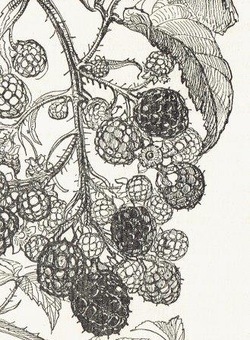 The Blackberries
The Blackberries
His mother had mentioned blackberries some days before. It was at teatime. The boy’s father had been speaking with some eloquence on the subject of his wife’s baking skills. In fact, anyone arriving at that moment might easily have been forgiven for thinking he was composing a eulogy for someone recently departed, and not merely singing the praises of his wife’s rhubarb tart.
“That was a marvellous tart,” the father said.
“Not bad,” replied his wife, who was known to be something of a tyrant when it came to shortcrust pastry, “A bit short on lard today I was.”
The boy’s father shook his head in vigorous disagreement. It was his custom to always deny any culinary shortcomings his wife confessed to.
The boy looked down with regret at his scraped-clean dish and wished he’d eaten slower. He closed one eye and began to secretly conjure a rhubarb tart island partially submerged under an ocean of evaporated milk, wishing his bowl to magically refill.
His mother went on with her blistering analysis and self-appraisal, “Perhaps a bit more sugar on the rhubarb ... thought it was a bit on the sharp side.”
“Well, I thought it was very nice. What about you?” said the father, prompting the boy to voice an opinion.
“Lovely,” said the boy.
“Mmm ... maybe it’s me then,” his Mam said, “Mind, I’ve never been a big one for rhubarb,” she continued, “Blackberries are my favourite.”
The seed was sown. A day or two later the boy noticed how the berries were ripening in the hedgerows. On his way home from school he was walking alongside another boy, a sometime ally by the name of John. They lived in the same direction. John was a year above the boy in school but they went to the same chapel and were in the same Sunday school class.
“I’m comin’ back out when I gets in,” said the boy, “I’m going to pick some blackberries for my Mam.”
John considered the premise a moment. “Me an' all,” he said, “I’ll come round for you.”
“Alright,” said the boy.
Mam was delighted when the boy told her his intention. She supplied him with an enamel bowl. “I’d better get on and make a bit of pastry then,” she said. The boy changed into his play clothes, but now they were the clothes of a great hunter, and before leaving the house on his intrepid search for blackberries he took a glass of milk and a digestive biscuit to sustain him on his safari.
John came as arranged, although he wasn’t alone, he’d brought a friend with him who the boy only knew by sight. There were no introductions. John had one of his mother’s bowls tucked under an arm, the other boy had no visible container.
“What you going to collect yours in?” the boy inquired of the friend.
“I’m just comin’along to help,” he replied.
“Alright. Where to then?” asked John, “The rec ... back of the cricket pitch ... round by the old works?”
The boy knew where the very best blackberries always were. There was a large patch of wasteground behind the bus shelter, it was overgrown with bramble bushes half as high as a house, or at least that was how they seemed to him. The boy spoke with such conviction on the subject of location that his companions went along with it.
The boy had chosen well, the brambles behind the bus shelter were richly adorned with the purplish-black jewels, big, plump, luscious blackberries, ripe and lovely, just begging to be plucked. The boy took his sizeable enamel dish to be a challenge and began to pick with much diligence. He was determined to fill it until it overflowed. His family would feast on the finest blackberry tart ever tasted in the whole of Wales! A tart that would be talked of for years to come!
The boy was only vaguely aware of the other two, who were messing around a lot and not getting much picking done. The boy intrepidly leaned and stretched into the bramble bushes, acquiring multiple scratches along his arms and hands but not caring much, for his eye was clearly set on its goal.
The boy’s dish was well above the halfway point when John’s friend suddenly voiced an idea, “Tell you what, let’s pool ‘em!”
The boy was horrified at the thought, “But I’ve got loads more than you!” he responded.
“True,” agreed John’s friend, who almost certainly went on to become a politician in later life, “But what I’m suggesting is pooling together so as to help each other. You give what you’ve picked to John, then afterwards we’ll help fill up your dish.”
“I think things is alright the way they is,” said the boy.
“Don’t you trust us?” John’s friend asked, sounding rather offended by the younger boy’s lack of trust.
“It’s just that I’ve got some really big juicy ones.”
John’s friend shook his head as if exasperated by the dimness of some people. “That’s the whole point! We’ll help you get tons more ... the biggest, fattest most juiciest ones. We’re taller than you, so we can reach and get the very best,” he said, then demonstrated by stretching out to reach a massive fat berry well beyond the boy’s reach. He popped the picked fruit into his mouth then displayed his tongue dyed dark purple from its flesh and juice. “Go on. You help John, then we can help you.”
“Yes,” agreed John, holding his bowl out towards the boy in expectation.
“It makes more sense. We’ll pick a lot more if we all work together ... like during the war,” added John’s friend after a philosophical pause.
“Promise if I give you mine, you’ll help me back?”
“I give you my word,” said the future politician.
“Alright,” said the boy, tipping his hard-earned blackberries into John’s bowl, which made it instantly very nearly full.
“Great stuff,” said John’s friend,”We’ll help you now.”
But it turned out as the boy had first feared. John and his friend continued to mess about and almost all the berries that made their way into his now sparsely-populated dish were generally picked by himself. After a time he became acutely aware of some whispering and sniggering coming from the other two.
When the village clock was heard striking five o’clock, John said, “Five. My Mam told me I was to be home by five.”
“Mine too,” said his friend.
“But you said you was going to stay and help me!”
“I could come back later on,” said John’s friend, adopting a conciliatory note, “After tea ... no wait a minute, sorry, no can do ... ‘cos I’m goin’ to the Roxy tonight to see John Wayne with my sister and her boyfriend.”
“You promised!”
“I never promised!” said John forcefully.
“You’re right, I did say I’d help you,” said the friend, “But I didn’t say I’d stay right this minute an’ do it. I already said why I can’t come back after tea tonight, but we could arrange for another day?”
“But you said!” screamed the boy, unable to prevent the tears springing from the corners of his eyes.
“Don’t shout at me!” said John’s friend aggressively. He pushed the boy in the chest, it sent him flying along with his dish of blackberries. The attacker struck a pose that spoke of moral indignation, “I was going to stay and help even though I’m wanted back home ... but seein’ as you’ve taken that tone of voice with me, now I’m definitely not!”
The two bigger boys turned and began to walk away, laughing as they went.
“Stupid bloody cry baby!” John called back at the weeping boy who was sat on the ground surrounded by his spilled blackberries. As they disappeared from view, the boy, though still sobbing, began to wipe his face. These tears, as they mingled with the sticky sweet blackberry juice on his fingers, had a taste and smell he could recall years later.
After a time the boy stopped crying and got what blackberries he could salvage from the grass. Then he set off picking once again, but the best fruit had either been taken before and were now in John’s bowl or out of his reach. He guessed it must be getting late and that he’d soon be expected at home for his tea. He managed to fill about a quarter of the dish then shuffled off home, head down and dejected.
His mother looked surprised and somewhat disappointed by the number of berries the boy had managed to collect in the amount of time he’d been away; but then she’d come to accept that there was never any telling with boys. He never told her what had happened, about how he’d trusted and been tricked; he felt a fool about it.
His mother augmented the blackberries with some cooking apples she had in the pantry cupboard. There was apple and blackberry tart for two days. His father was of course very complimentary about these. And they were fine tasting tarts indeed; yet somehow, apple and blackberry wasn’t quite as good as blackberry by itself.
The boy continued to pick blackberries for his mother every year, but he never forgot how he’d been diddled out of his share that time.
 The Blackberries
The BlackberriesHis mother had mentioned blackberries some days before. It was at teatime. The boy’s father had been speaking with some eloquence on the subject of his wife’s baking skills. In fact, anyone arriving at that moment might easily have been forgiven for thinking he was composing a eulogy for someone recently departed, and not merely singing the praises of his wife’s rhubarb tart.
“That was a marvellous tart,” the father said.
“Not bad,” replied his wife, who was known to be something of a tyrant when it came to shortcrust pastry, “A bit short on lard today I was.”
The boy’s father shook his head in vigorous disagreement. It was his custom to always deny any culinary shortcomings his wife confessed to.
The boy looked down with regret at his scraped-clean dish and wished he’d eaten slower. He closed one eye and began to secretly conjure a rhubarb tart island partially submerged under an ocean of evaporated milk, wishing his bowl to magically refill.
His mother went on with her blistering analysis and self-appraisal, “Perhaps a bit more sugar on the rhubarb ... thought it was a bit on the sharp side.”
“Well, I thought it was very nice. What about you?” said the father, prompting the boy to voice an opinion.
“Lovely,” said the boy.
“Mmm ... maybe it’s me then,” his Mam said, “Mind, I’ve never been a big one for rhubarb,” she continued, “Blackberries are my favourite.”
The seed was sown. A day or two later the boy noticed how the berries were ripening in the hedgerows. On his way home from school he was walking alongside another boy, a sometime ally by the name of John. They lived in the same direction. John was a year above the boy in school but they went to the same chapel and were in the same Sunday school class.
“I’m comin’ back out when I gets in,” said the boy, “I’m going to pick some blackberries for my Mam.”
John considered the premise a moment. “Me an' all,” he said, “I’ll come round for you.”
“Alright,” said the boy.
Mam was delighted when the boy told her his intention. She supplied him with an enamel bowl. “I’d better get on and make a bit of pastry then,” she said. The boy changed into his play clothes, but now they were the clothes of a great hunter, and before leaving the house on his intrepid search for blackberries he took a glass of milk and a digestive biscuit to sustain him on his safari.
John came as arranged, although he wasn’t alone, he’d brought a friend with him who the boy only knew by sight. There were no introductions. John had one of his mother’s bowls tucked under an arm, the other boy had no visible container.
“What you going to collect yours in?” the boy inquired of the friend.
“I’m just comin’along to help,” he replied.
“Alright. Where to then?” asked John, “The rec ... back of the cricket pitch ... round by the old works?”
The boy knew where the very best blackberries always were. There was a large patch of wasteground behind the bus shelter, it was overgrown with bramble bushes half as high as a house, or at least that was how they seemed to him. The boy spoke with such conviction on the subject of location that his companions went along with it.
The boy had chosen well, the brambles behind the bus shelter were richly adorned with the purplish-black jewels, big, plump, luscious blackberries, ripe and lovely, just begging to be plucked. The boy took his sizeable enamel dish to be a challenge and began to pick with much diligence. He was determined to fill it until it overflowed. His family would feast on the finest blackberry tart ever tasted in the whole of Wales! A tart that would be talked of for years to come!
The boy was only vaguely aware of the other two, who were messing around a lot and not getting much picking done. The boy intrepidly leaned and stretched into the bramble bushes, acquiring multiple scratches along his arms and hands but not caring much, for his eye was clearly set on its goal.
The boy’s dish was well above the halfway point when John’s friend suddenly voiced an idea, “Tell you what, let’s pool ‘em!”
The boy was horrified at the thought, “But I’ve got loads more than you!” he responded.
“True,” agreed John’s friend, who almost certainly went on to become a politician in later life, “But what I’m suggesting is pooling together so as to help each other. You give what you’ve picked to John, then afterwards we’ll help fill up your dish.”
“I think things is alright the way they is,” said the boy.
“Don’t you trust us?” John’s friend asked, sounding rather offended by the younger boy’s lack of trust.
“It’s just that I’ve got some really big juicy ones.”
John’s friend shook his head as if exasperated by the dimness of some people. “That’s the whole point! We’ll help you get tons more ... the biggest, fattest most juiciest ones. We’re taller than you, so we can reach and get the very best,” he said, then demonstrated by stretching out to reach a massive fat berry well beyond the boy’s reach. He popped the picked fruit into his mouth then displayed his tongue dyed dark purple from its flesh and juice. “Go on. You help John, then we can help you.”
“Yes,” agreed John, holding his bowl out towards the boy in expectation.
“It makes more sense. We’ll pick a lot more if we all work together ... like during the war,” added John’s friend after a philosophical pause.
“Promise if I give you mine, you’ll help me back?”
“I give you my word,” said the future politician.
“Alright,” said the boy, tipping his hard-earned blackberries into John’s bowl, which made it instantly very nearly full.
“Great stuff,” said John’s friend,”We’ll help you now.”
But it turned out as the boy had first feared. John and his friend continued to mess about and almost all the berries that made their way into his now sparsely-populated dish were generally picked by himself. After a time he became acutely aware of some whispering and sniggering coming from the other two.
When the village clock was heard striking five o’clock, John said, “Five. My Mam told me I was to be home by five.”
“Mine too,” said his friend.
“But you said you was going to stay and help me!”
“I could come back later on,” said John’s friend, adopting a conciliatory note, “After tea ... no wait a minute, sorry, no can do ... ‘cos I’m goin’ to the Roxy tonight to see John Wayne with my sister and her boyfriend.”
“You promised!”
“I never promised!” said John forcefully.
“You’re right, I did say I’d help you,” said the friend, “But I didn’t say I’d stay right this minute an’ do it. I already said why I can’t come back after tea tonight, but we could arrange for another day?”
“But you said!” screamed the boy, unable to prevent the tears springing from the corners of his eyes.
“Don’t shout at me!” said John’s friend aggressively. He pushed the boy in the chest, it sent him flying along with his dish of blackberries. The attacker struck a pose that spoke of moral indignation, “I was going to stay and help even though I’m wanted back home ... but seein’ as you’ve taken that tone of voice with me, now I’m definitely not!”
The two bigger boys turned and began to walk away, laughing as they went.
“Stupid bloody cry baby!” John called back at the weeping boy who was sat on the ground surrounded by his spilled blackberries. As they disappeared from view, the boy, though still sobbing, began to wipe his face. These tears, as they mingled with the sticky sweet blackberry juice on his fingers, had a taste and smell he could recall years later.
After a time the boy stopped crying and got what blackberries he could salvage from the grass. Then he set off picking once again, but the best fruit had either been taken before and were now in John’s bowl or out of his reach. He guessed it must be getting late and that he’d soon be expected at home for his tea. He managed to fill about a quarter of the dish then shuffled off home, head down and dejected.
His mother looked surprised and somewhat disappointed by the number of berries the boy had managed to collect in the amount of time he’d been away; but then she’d come to accept that there was never any telling with boys. He never told her what had happened, about how he’d trusted and been tricked; he felt a fool about it.
His mother augmented the blackberries with some cooking apples she had in the pantry cupboard. There was apple and blackberry tart for two days. His father was of course very complimentary about these. And they were fine tasting tarts indeed; yet somehow, apple and blackberry wasn’t quite as good as blackberry by itself.
The boy continued to pick blackberries for his mother every year, but he never forgot how he’d been diddled out of his share that time.
Published on May 09, 2014 16:10
May 2, 2014
King Lear
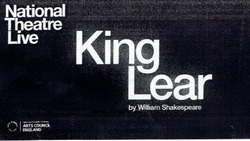 King Lear is a Shakespearean tragedy I’m quite familiar with, having watched numerous productions over the years on both stage and screen. It is a monumental play, and it is a testimony to Shakespeare’s greatness and universality as a playwright that this four hundred year old melodrama concerning familial loyalty and betrayal, can bear so many incarnations. The play’s themes are as valid today as they were back in the earliest years of the seventeenth century when it was written.
King Lear is a Shakespearean tragedy I’m quite familiar with, having watched numerous productions over the years on both stage and screen. It is a monumental play, and it is a testimony to Shakespeare’s greatness and universality as a playwright that this four hundred year old melodrama concerning familial loyalty and betrayal, can bear so many incarnations. The play’s themes are as valid today as they were back in the earliest years of the seventeenth century when it was written. The drama unfolds as a direct consequence of Lear’s blind arrogance and failure to either hear or accept the truth. At the play’s start he rashly commends and generously rewards his two honey-tongued and avaricious daughters, Goneril and Regan, whilst at the same time banishing his honest child Cordelia. The character of Gloucester too, rejects his good and faithful son Edgar after believing without making appropriate investigation the lies of his scheming bastard son, the evil Edmund. These knee-jerk actions on Gloucester’s part mirror Lear’s earlier foolishness. Blindness is a motif that runs throughout the play: Gloucester only sees his own errors clearly once he has been made physically blind, and at the play’s start Lear, we observe, is blinded by his own vanity. Lear’s not simply just a father though, he is also a king, therefore his mistakes have far-reaching consequences; his foolish actions create an opportunity for evil to thrive in his kingdom, unleashing civil war upon his land and people. Shakespeare is warning us against having too much pride, reminding us to see the world and our role and place in it, right-sized. At the end, the stage littered with corpses, Lear makes his final entrance bearing the dead Cordelia in his arms, by this time fully contrite with humility. It is a moral tale about the wielding of temporal power and human folly - "Thou shouldst not have been old till thou hadst been wise".
Last night we went to see the NT Live production of King Lear with Simon Russell Beale in the title role. Beale is a highly accomplished actor, always a beautiful interpreter of Shakespeare, and his performance did not disappoint. Yet this is not in my opinion a great production of the play, although I must also say, I enjoyed it immensely. However, I didn’t feel that all the casting choices, or the direction, were always delivering or giving Simon Russell Beale the support necessary to make this a truly outstanding production. Despite this criticism, many of the performances were spot-on and I was particularly impressed by, Stanley Townsend as Kent, Stephen Boxer as Gloucester, Kate Fleetwoood as Goneril, Richard Clothier as Albany, and last but not least, Adrian Scarborough as The Fool.
Therefore in my view, certainly very good - with some reservations. But then, any production of a Shakespeare tragedy that can keep its audience sustained through a two hour first half has to be worth seeing - as this was.
Published on May 02, 2014 11:00
April 24, 2014
Richard and Jane
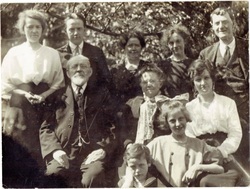 The elderly pair at the heart of this family portrait were my Great-Grandparents, Richard and Jane. They were the parents of my my maternal grandmother Gwenllian - who was generally just called Gwen. That’s her, my Nan, in the back row on the far left. She had long auburn hair and was considered quite a beauty in her day. However you never think about your own Nan in such terms. As far as I was concerned she was simply very kind and perhaps more importantly, because of the sometimes slightly mercenary nature of children, always generous. By the time I got to know her, her hair was totally white, just like mine is today. The only other person in the picture that I knew personally was Richard and Jane’s other daughter, Mary. She’s also in the back row, in the middle. Mary, or Bopa Mary (Bopa being Valleys’ dialect for Aunty) as I always called her, lived with us (as did my grandparents) from the time I was five.
The elderly pair at the heart of this family portrait were my Great-Grandparents, Richard and Jane. They were the parents of my my maternal grandmother Gwenllian - who was generally just called Gwen. That’s her, my Nan, in the back row on the far left. She had long auburn hair and was considered quite a beauty in her day. However you never think about your own Nan in such terms. As far as I was concerned she was simply very kind and perhaps more importantly, because of the sometimes slightly mercenary nature of children, always generous. By the time I got to know her, her hair was totally white, just like mine is today. The only other person in the picture that I knew personally was Richard and Jane’s other daughter, Mary. She’s also in the back row, in the middle. Mary, or Bopa Mary (Bopa being Valleys’ dialect for Aunty) as I always called her, lived with us (as did my grandparents) from the time I was five.This photograph is the only known entire family group of Richard and Jane and their four children. Their youngest son William is next to my grandmother, and the eldest son Tom is over on the far right. Richard and Jane had nine children, but infant mortality was particularly high in the South Wales Valleys during the Victorian era, and only these four survived to adulthood. They look proud of their family, and so they should be, because only a generation or so before their families were illiterate, itinerant labourers, who marked a cross for their names. Richard, who had been a collier himself as a young man, ended up with his own small butcher shop, and he and Jane between them produced two teachers - my Nan and her brother Tom, who actually ended up a Headmaster.The other brother William was an accountant. Mary, a real character, wasn’t very taken with learning, and was happy to leave school at eleven, but she was literate and numerate and had her own little shop in Trecynon, Aberdare. The lady seated beside Richard and Jane is Tom’s wife and the mother of their first three grandchildren. The pretty young girl standing next to Tom in the back row is his eldest daughter, who was sadly to die of appendicitis very shortly.
The picture has numerous stories to tell and I am so glad that my own son Tom took the time to sit down with my mother, (not yet born at the time it was taken) and get her to accurately name everyone in it. I calculate that the photograph was taken shortly after the First World War - perhaps as a reminder of how fortunate they had been to all come safely through it. I suspect the picture was taken by my grandfather - also called Martin like myself, who was a keen amateur photographer and who would have already been courting my Nan by this time. What I particularly love about the photograph is how relaxed and happy everyone looks - unusual for the rather stuffy group portraits more generally seen from this era. Another thing that makes it unusual is that it was taken outdoors in beautiful natural sunlight - most photographs from those times were shot inside against a studio backdrop.
Last weekend my wife Judith and I went for a long weekend to Cardiff. We met up with two descendants of Richard and Jane, themselves great-grandchildren like me. It was exciting and a little strange because I hadn’t seen them since I was ten or eleven. They are the children of the small boy in the sailor suit in the foreground. Like myself they were born several decades after both our great-grandparents had passed away.
When I do a quick calculation I reckon there are now something like twenty-four people currently alive who are directly descended from Richard and Jane.
Published on April 24, 2014 13:44
April 17, 2014
Turner, The Sea and Therese
 National Maritime Museum, Greenwich If, like us, you enjoy a wide range of interests, then you’ll appreciate the regular dilemma in the Johnson household is simply choosing what to prioritise out of the many great things always available to see and do. Judith has been pointing out since last November how much she wanted to visit Turner and the Sea at the National Maritime Museum, Greenwich. We managed to get there about a week before the closing bell - the exhibition ends very shortly on 21 April. A lifelong admirer of this great English painter, I am so glad that we didn’t miss it. As a schoolboy who pursued Art as a main subject, I was deeply captivated by his paintings, more so probably than by any other British artist. I was mesmerised by the painterly virtuosity he possessed. He seemed to own an ability to bend light, to create both movement and momentum in his works, to blend, morph and fade his palette almost to the point of abstraction. He is unique, and it has always saddened me that there isn’t a Turner Museum entirely dedicated to his work and the large legacy of paintings, studies and sketches he bequeathed the Nation in his will. There is of course a large changing display at the Clore Gallery at Tate Britain.
National Maritime Museum, Greenwich If, like us, you enjoy a wide range of interests, then you’ll appreciate the regular dilemma in the Johnson household is simply choosing what to prioritise out of the many great things always available to see and do. Judith has been pointing out since last November how much she wanted to visit Turner and the Sea at the National Maritime Museum, Greenwich. We managed to get there about a week before the closing bell - the exhibition ends very shortly on 21 April. A lifelong admirer of this great English painter, I am so glad that we didn’t miss it. As a schoolboy who pursued Art as a main subject, I was deeply captivated by his paintings, more so probably than by any other British artist. I was mesmerised by the painterly virtuosity he possessed. He seemed to own an ability to bend light, to create both movement and momentum in his works, to blend, morph and fade his palette almost to the point of abstraction. He is unique, and it has always saddened me that there isn’t a Turner Museum entirely dedicated to his work and the large legacy of paintings, studies and sketches he bequeathed the Nation in his will. There is of course a large changing display at the Clore Gallery at Tate Britain.It was marvellous to experience this current Greenwich exhibition, entirely dedicated to Turner’s lifelong fascination with the sea. In 1796, aged just twenty-one, Turner exhibited ‘Fishermen at Sea’ at the Royal Academy Summer Exhibition - the first of many marine paintings he produced throughout his fairly long life. I suppose the sea as a subject is not altogether surprising for someone of our island race, where it’s never possible to be more than seventy miles from a coastline. Incidentally, the majority of Turner’s sea paintings were concentrated in the earlier and later years of his life.
On the same day, we managed to get across to the Finborough Theatre, Earls Court to see an excellent musical adaptation of Therese Raquin. The novel is of course by Emile Zola, a book which I’m sorry to say I’ve not (yet) read. I mentioned that we were planning to see this production to a friend who is not only very well-read but also a great aficionado of musical theatre. However, I couldn’t persuade him to come along with us, his email back read, “Oooh, I read the novel at university, it’s an awfully dark subject for a musical ...” My wife, Judith, who has also read the book, was equally quite intrigued at the prospect of seeing it staged in this way.
The show, I am pleased to say, exceeded expectations. We were totally drawn in and captivated by the action. The production design managed to conjure up the grim claustrophobic environment where these lower middle-class Parisians act out their sad drama of betrayal, repressed sexual passions, murder and hellish despair. It’s hardly any great surprise that Zola’s novel was considered scandalous in its day - it is still immensely powerful stuff!
The main roles are fully inhabited by Julie Atherton, Tara Hugo, Jeremy Legat and Ben Lewis. The singing, by a surprisingly large ensemble cast for such a tiny venue, is excellent. I imagine the ease with which the drama appears to unfold before its audience, only goes to demonstrate the skill of its performers. I am no singer myself but I know enough to understand how technically demanding performing this work has to be. The musical score is composed by Craig Adams with book, lyrics and direction by Nona Sheppard. It seems a shame that such a powerful production, due to close shortly when it comes to the end of its allotted run, can’t be re-mounted in a bigger venue for a larger audience to appreciate what is a wholly impressive piece of work from everyone concerned.
Published on April 17, 2014 04:27
April 11, 2014
Sharing and People Building
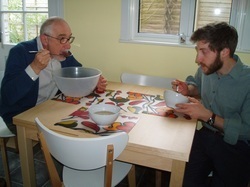 I genuinely enjoy the experience of sitting down and writing. I find the daily practice totally absorbing, and almost without fail, by the time I’ve reached the end of my daily word quota, the five or six hours necessary seem to have flown by. However, after getting to the last page of a (very large first) draft, I found myself suffering from the non-life-threatening ailment of ‘writer’s butt’. So, I am taking a break from putting too much pressure on ‘it’ and getting down to some jobs requiring attention. I’m fairly easily satisfied in what I do, just as long as I’m fully engaged, however, I am incapable of doing nothing at all. One of life’s (many) little pleasures for me is an occasional bout of physical activity, but it has to have some goal in mind other than just being exercise. I mean, send me to the gym for a daily workout and by the end of a month I reckon I’d be a candidate for Prozac. But give me an overgrown garden to dig or tell me to hack off old plaster and I’ll be as happy as a sandboy!
I genuinely enjoy the experience of sitting down and writing. I find the daily practice totally absorbing, and almost without fail, by the time I’ve reached the end of my daily word quota, the five or six hours necessary seem to have flown by. However, after getting to the last page of a (very large first) draft, I found myself suffering from the non-life-threatening ailment of ‘writer’s butt’. So, I am taking a break from putting too much pressure on ‘it’ and getting down to some jobs requiring attention. I’m fairly easily satisfied in what I do, just as long as I’m fully engaged, however, I am incapable of doing nothing at all. One of life’s (many) little pleasures for me is an occasional bout of physical activity, but it has to have some goal in mind other than just being exercise. I mean, send me to the gym for a daily workout and by the end of a month I reckon I’d be a candidate for Prozac. But give me an overgrown garden to dig or tell me to hack off old plaster and I’ll be as happy as a sandboy!Yesterday, my son Tom came round to help me re-felt the roof on our garden shed. It was a lovely warm, sunny day and really great after so many grey wet months to be working outside again. Judith, over breakfast this morning, clearly enjoyed pointing out that my scalp, once graced by long, thick, chestnut locks, but now hirsutely-challenged and therefore a little sensitive to ‘the eye of heaven’, was looking a bit red and shiny. In response to this wifely mocking I simply adopted a look of noble indifference and attended to my egg and soldiers.
 Tom and I have been doing jobs together since he was very small. I recall we built shelves for his bedroom when he was about seven. I let him measure and cut and drill all the wood under my close supervision. It was a very slow process and a bit frustrating as I could have done it all by myself in about a tenth of the time. I recall him asking me with sober concern for my well-being if I’d mind him going off to watch his favourite serial The Lion, the Witch and the Wardrobe on TV - once he’d gone off, after I’d said I thought I could probably cope on my own for a bit, I admit to punching the air gleefully at the thought of being finally able to crack on!
Tom and I have been doing jobs together since he was very small. I recall we built shelves for his bedroom when he was about seven. I let him measure and cut and drill all the wood under my close supervision. It was a very slow process and a bit frustrating as I could have done it all by myself in about a tenth of the time. I recall him asking me with sober concern for my well-being if I’d mind him going off to watch his favourite serial The Lion, the Witch and the Wardrobe on TV - once he’d gone off, after I’d said I thought I could probably cope on my own for a bit, I admit to punching the air gleefully at the thought of being finally able to crack on!
 However, when we allow our children to assist and learn like this far more is being given than just a few basic skills - we are really building people. All around our home there is evidence of work shared in this way. It was the same back home in Wales when my Dad and I built a concrete base for his garage and took on many other tasks together. Dad had a great many fine qualities, but was surprisingly ungifted at most jobs requiring even quite rudimentary building or DIY skills - even so, it was still always fun to work together!
However, when we allow our children to assist and learn like this far more is being given than just a few basic skills - we are really building people. All around our home there is evidence of work shared in this way. It was the same back home in Wales when my Dad and I built a concrete base for his garage and took on many other tasks together. Dad had a great many fine qualities, but was surprisingly ungifted at most jobs requiring even quite rudimentary building or DIY skills - even so, it was still always fun to work together!
Published on April 11, 2014 06:48
April 4, 2014
From Gorseinon With Great Fondness
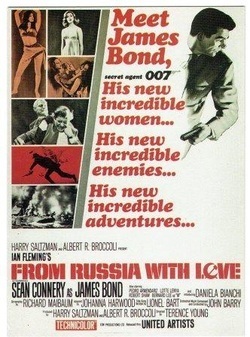 Sometimes on long car journeys my wife Judith and I will pass the time by listing our ten favourite film comedies or ten best books etc. I think I’d definitely have to include a Sean Connery outing as James Bond somewhere; perhaps on a list entitled Favourite Action Movies or Favourite Movie Characters perhaps. I haven’t seen all the Bond movies by any means, but I have seen at least one or two from every actor who took over the role, and I don’t think, in my own undoubtedly biased view, that anyone has played Bond with more flair or panache than Connery. The only Bond films I own on DVD are the Connery ones and I personally adore From Russia With Love best of all.
Sometimes on long car journeys my wife Judith and I will pass the time by listing our ten favourite film comedies or ten best books etc. I think I’d definitely have to include a Sean Connery outing as James Bond somewhere; perhaps on a list entitled Favourite Action Movies or Favourite Movie Characters perhaps. I haven’t seen all the Bond movies by any means, but I have seen at least one or two from every actor who took over the role, and I don’t think, in my own undoubtedly biased view, that anyone has played Bond with more flair or panache than Connery. The only Bond films I own on DVD are the Connery ones and I personally adore From Russia With Love best of all.As I’ve written before on this subject ( Double - Oh - Fifty ) I thoroughly enjoyed every one of the early Bond movies, which fired up my boyhood imagination. Throughout the Sixties all the local cinemas in the UK remained mostly intact although constantly haemorrhaging more and more audience to television. We didn’t have the luxury of revisiting a favourite film on video, DVD or by streaming on demand back then, and the local ‘flea-pit’ provided an opportunity to revisit some older films. If me and my chums wanted to watch a more recent film then we had to get a bus into Swansea - and pocket-money didn’t always stretch to this. I spent many a contented evening at the long-since closed Lido, Gorseinon, watching James Bond in thrilling double bills. When we watched Bond our attention was completely taken up. However, when the film was bad, or truly dire, as many of the B movies in those days were, our attention wandered. If not engaged by what was happening on screen, we sometimes turned our attention to vacating our cheap 1/6d (7p) seats and outwitting the ageing, torch-wielding, gruff-voiced usherettes who guarded and patrolled the 2/6d (12p) seats in the Circle like a marauding army of Welsh prop-forwards. We generally failed in this objective and were told to either behave ourselves or get booted out, but it never went quite that far. After all, we were some of their best paying customers, us and the older boys and girls always found necking in the back rows.
What is it about From Russia With Love that makes me rank it so highly? I don’t know, I simply love its stylishness, the location work in Istanbul, and its wonderful set designs, particularly the one for the chess tournament. I found Lotte Lenya and her poison-tipped shoe jaw-droppingly wicked as a small boy - actually, I still find Rosa Klebb a bit scary! Robert Shaw provided Bond with an adversary who is in nearly every way his equal. Of course, when Bond catches him ordering white wine with red meat (or is it red wine with fish?) - he rumbles him immediately - Bond knows that no British gentleman would ever make such a dreadful faux pas! Tee hee hee! Yes, very snobbish and quite, quite, silly, but greatly entertaining. It is the film where we are introduced to SPECTRE boss Ernst Blofeld and meet Desmond Llewelyn as Q for the first time. The theme song, sung by Matt Monro, comes at the movie’s end but to my mind ranks as one of the best ever. It has a simple but strong plot and the series is still building the formula that comes to full fruition in its next serving, Goldfinger. I think I like it best though because it has an edge, a grittiness that from Goldfinger on simply becomes ‘Bond style’ - nothing feels like it is simply a set piece yet. Throughout the film you sense that the love interest Daniela Bianchi (whose beauty I recall used to make me feel somewhat ‘strange’ as a small boy) and Bond are in a lot of danger and you feel genuinely concerned for them.
I found this interesting quote from Richard Roud writing in the Guardian at the time,”... the film is highly immoral in every imaginable way; it is neither uplifting, instructive nor life-enhancing. Neither is it great film-making. But it sure is fun.”
Just imagine what the same writer might have said if they could have taken a peek into the future at what was to come?
Published on April 04, 2014 05:27
March 27, 2014
Catching the 3:10, Gregory Porter and Other Stuff
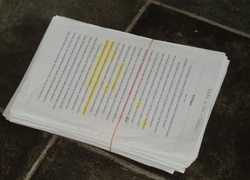 I completed the first draft of the new book I’ve been working on a week ago. It’s massive and will need to be savagely reduced, but then that’s the way I like to work. I plan to spend a few weeks attending to some other stuff that needs my attention, then will return to it with a refreshed eye. I was ordered not to do very much this week by my wife Judith. I guess she knows the signs of when I’m tired far better than I do! I generally only realise I’ve reached the point of exhaustion when I sense an overwhelming desire to collapse to the floor and weep - I’m so lucky to have a partner who knows what I’m like and generally warns me off long before I actually reach this point. It was a good week, and I felt seriously proud when a friend whose opinions on any kind of literary offering I highly value, contacted me to let me know just how much they had enjoyed Niedermayer & Hart. He took the time to write and send an in-depth analysis of what he’d liked about the book. My tail hasn’t stopped wagging since!
I completed the first draft of the new book I’ve been working on a week ago. It’s massive and will need to be savagely reduced, but then that’s the way I like to work. I plan to spend a few weeks attending to some other stuff that needs my attention, then will return to it with a refreshed eye. I was ordered not to do very much this week by my wife Judith. I guess she knows the signs of when I’m tired far better than I do! I generally only realise I’ve reached the point of exhaustion when I sense an overwhelming desire to collapse to the floor and weep - I’m so lucky to have a partner who knows what I’m like and generally warns me off long before I actually reach this point. It was a good week, and I felt seriously proud when a friend whose opinions on any kind of literary offering I highly value, contacted me to let me know just how much they had enjoyed Niedermayer & Hart. He took the time to write and send an in-depth analysis of what he’d liked about the book. My tail hasn’t stopped wagging since!On Saturday evening we watched 3:10 to Yuma - the original Glenn Ford, Van Heflin film of that title made in 1957, as opposed to the Russell Crowe, Christian Bale 2009 remake. They are both good movies, with faultless performances from both sets of leading actors, however for me it’s only the ’57 film that deserves to be hailed a classic Western. The earlier version lacks the extremely dark post-modernist ending of the later film. The short story upon which both scripts were based was penned by Elmore Leonard, which I haven’t read but most certainly plan on doing. Judith remains keen on watching any kind of cowboy film and has recently been observed by myself (still nursing some very grave suspicions - see earlier post Could the Aliens who Abducted my Wife Please Return Her!) at bedtime excitedly turning the pages of a compendium of short stories entitled The Giant Book of Western Stories. Weird, huh?
On Sunday we went to see the extraordinary jazz singer Gregory Porter at the Assembly Rooms, Tunbridge Wells. He possesses one of those rare voices that isn’t really definable, no matter how many adjectives can be strung together to assist with this purpose. But I think if you’ve ever heard him sing you’ll know immediately what I mean. The wife and I don’t really typify your regular jazz lovers, but then Gregory Porter doesn’t typify the regular jazz singer. I’ve heard him described as a ‘Jazz’ singer who possesses a ‘Soul’ voice. I suppose both of us have a deep and abiding fondness for classic soul and perhaps this is why he appeals so much. His aura as a performer radiates great warmth, which is not an inconsiderable feat at the Assembly Rooms, as this is not a venue that could ever be classified as intimate. Apparently, Porter, who grew up in California, planned to be an American Football player but his plans were scuppered by a shoulder injury. It’s hard to believe that someone with such incredible vocal talent might have considered a career in any other field. It’s also difficult to understand why Porter, born in 1971, has taken all this time to receive anything like the recognition he deserves. We first saw him on the Jools Holland show and certainly hope to see him again whenever he tours the UK. The four musicians supporting him were equally superb and deserve mentioning too: pianist and music director, Chip Crawford, drummer Emanuel Harrold, bassist Aaron James, and alto saxophonist Yosuke Sato. It was a tremendous evening. I highly recommend listening to this man, take a look at the Gregory Porter website where you get the opportunity to hear a few tracks. Enjoy!
Published on March 27, 2014 13:01
March 20, 2014
The Stinker!
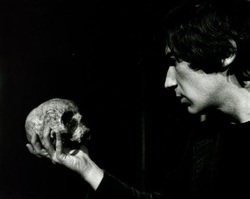 What is ‘a stinker’? Well, in my own personal definition it’s a play or film that is so bad you wish your name could be erased from any association with it. Every actor has a stinker or two (or three) lurking somewhere, much like the proverbial skeleton in the closet. I recall my father, who never minced his words, coming to see some scenes from Shakespeare’s Measure for Measure early on in my training at RADA. The production was really awful “Don’t act ... feel the moment ... let the words play the scene” the director had implored us every time our survival instincts kicked in during rehearsals and we tried to raise the thing out of the doldrums. Dad, after watching my performance, exclaimed later in private in his honest Welsh valleys unvarnished way, “RADA training! That was the worst thing I’ve ever seen on a flippin’ stage in my life!”
What is ‘a stinker’? Well, in my own personal definition it’s a play or film that is so bad you wish your name could be erased from any association with it. Every actor has a stinker or two (or three) lurking somewhere, much like the proverbial skeleton in the closet. I recall my father, who never minced his words, coming to see some scenes from Shakespeare’s Measure for Measure early on in my training at RADA. The production was really awful “Don’t act ... feel the moment ... let the words play the scene” the director had implored us every time our survival instincts kicked in during rehearsals and we tried to raise the thing out of the doldrums. Dad, after watching my performance, exclaimed later in private in his honest Welsh valleys unvarnished way, “RADA training! That was the worst thing I’ve ever seen on a flippin’ stage in my life!”He was right of course. However, the thing about being in ‘a stinker’ is that the performer has to go on and do it again the next night. And I wasn’t yet ready to acknowledge and accept it as ‘a stinker’. I think I may even have waffled on about the underlying esoteric significance of the scenes and what we were trying to achieve. “Rubbish!” Dad reaffirmed.
He was right.
The College Principal, a marvellous man by the name of Hugh Crutwell, blamed the director and vowed that the man would never set foot in the Academy again, which I don’t believe he ever did.
That was my first brush with ‘the stinker’. I met a few plays later on in my rep days that were pretty undistinguished. The thing is, whilst rehearsing ‘the stinker’ you and the rest of the cast endlessly reassure yourselves that you’re doing something really important, yes different perhaps, but most definitely very worthwhile. However, when the curtain finally comes down on the last performance and you see the same relief you feel inside clearly etched on the faces of your fellow performers - you know then, without a shadow of a doubt you’ve been involved in ‘a stinker’! You head for the bar and commiserate with your colleagues. As you weave your way (often unsteadily in days past) towards your theatrical ‘digs’ you feel like a great weight has been lifted from your being!
What made me raise the subject of ‘stinkers’? For my wife’s birthday this year, one of the presents I gave her was a box set of Sidney Poitier films. In the Heat of the Night probably ranks as one of our all time favourite movies: great title song, title singer, script, acting and direction - a tick in every box! So imagine how delighted we were to finally have the chance to watch its sequel They Call Me Mister Tibbs for the first time. Oh dear! You can probably take every single item in the list above and replace the tick with a thick red line. Every performance and every throw-away line was delivered like it was a Hamlet soliloquy. Everyone, including Sidney Poitier, looked really bad; the car chase just looked silly; the reasons behind a character’s speech or actions seemed to make no sense whatever at times; a foot-chase with Poitier hunting down a bad guy looked like out-takes from a Naked Gun movie; the cast, tried and trusted paid-up members of the acting fraternity looked like veterans of a bad daytime soap. Ed Asner, an actor I generally admire, was lousy in two categories, for his performance and his terrible wig. Poor ol’ Sidney Poitier - the ignominy of landing himself in ‘a stinker’ after playing the same character in such a great classic. I did wonder for a moment if someone by the name of Max Bialystok was the movie’s Executive Producer.
But like I said at the top, nobody in the performing arts can elude ‘the stinker’ forever. My father-in-law, himself an actor of some distinction in his heyday, once told me a story of his own regrettable brush with an ill-fated production. It was his first major appearance in London’s West End. He proudly took a box for his family and friends, booked a table at the Savoy for afterwards and invited his cousin the British Ambassador to Moscow to the first night. It is easy to imagine his chagrin when the audience began boo-ing the performers whenever they appeared. The only good thing that came out of the night, he informed me, was that the show closed immediately.
Yep, ‘a stinker’!
Published on March 20, 2014 13:21
March 13, 2014
And the Winner is ...
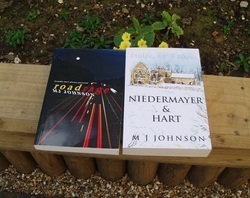 Two new garden varieties It’s rare that I don’t feel genuinely excited about writing and posting my weekly blog. I don’t see it as a chore at all. It has become something that I just do - a bit like brushing my teeth! Last week I was happy to announce my hundredth (blog post) birthday, and although I felt that I ought to definitely mark it in some way, it was with a certain hesitancy that I held a competition/giveaway. I’ve laboured to create interesting competitions before for local magazines etc, and the response has sometimes been about as dynamic as a middle-aged bald guy with a comb-over who acts like he’s a babe-magnet. Not hugely successful in other words! (unless of course you’re Christian Bale in American Hustle!)
Two new garden varieties It’s rare that I don’t feel genuinely excited about writing and posting my weekly blog. I don’t see it as a chore at all. It has become something that I just do - a bit like brushing my teeth! Last week I was happy to announce my hundredth (blog post) birthday, and although I felt that I ought to definitely mark it in some way, it was with a certain hesitancy that I held a competition/giveaway. I’ve laboured to create interesting competitions before for local magazines etc, and the response has sometimes been about as dynamic as a middle-aged bald guy with a comb-over who acts like he’s a babe-magnet. Not hugely successful in other words! (unless of course you’re Christian Bale in American Hustle!)I am pleased to tell you all however, that my ‘Hundredth Birthday Compo’ really was not only a lot of fun to do, but also received a terrific response, locally, nationally and internationally. It also received, by quite a wide margin, the most hits of any piece I’ve ever posted on this blog. Thanks very much to every single one of you for taking part! I’ll even forgive the handful of people who ignored my specific instructions and entered the compo by adding a comment to the blog itself without following the right and proper procedure! Tut! Tut! Tut!
N & H proved slightly more popular in terms of requests for a signed copy - but only just, and some folk who have read both books on their Kindles chose Roadrage or either. And the response was overall so excellent that I’ve decided to improve the conditions for winning and I’m therefore going to have two draws, one solely for the UK, the other for everyone who entered from overseas. Each draw will now give away a signed copy of each book - i.e. four books rather than the two I promised. So extra chances!
I’m really sorry that not all of you can be winners - but I guess that’s what makes it fun to enter competitions.
And for all you N & H lovers out there - incidentally, I’m always delighted to hear from you -I thought perhaps it was time I ‘fessed-up, as I reach the final few thousand words of a first draft - that I’ve actually been working on its sequel. So cast your mind back and remember where it left off, all those little loose ends after they’d left Hungary and ...
But don’t hold your breath, it’ll be many months yet before it’s complete!
The competition is now officially closed. I’ll let the winners know who they are very shortly.
Once again, my sincere thanks to all of you!
Published on March 13, 2014 12:51



